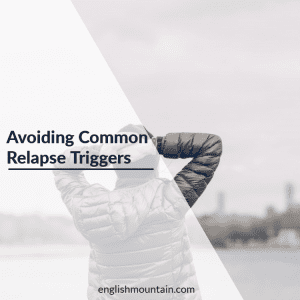
Rehab is behind you.
You’re facing the world with a renewed sense of self-worth and well-being. You have a positive outlook and are looking forward to living a healthy and happy life. During your time in a residential center, you built the foundation of your recovery. You learned coping skills and gained the tools you need to stay free of substance abuse.
You also learned about relapses. You know you must always be aware of the triggers that could send you back into the world of addiction.
What is Relapse?
When a person is drug or alcohol free for a length of time and then returns to substance abuse, it’s called a relapse. A relapse can be a one time occurrence or a return to total addictive behavior. Substance abuse addiction is a chronic brain disease and like many other diseases, there is a risk of relapse. Being aware of the causes, symptoms, and signs of relapse helps to minimize the chances of experiencing one.
Relapse Triggers
Although relapse triggers differ from one person to another, all triggers cause strong emotional memories of past times related to taking the drug. It reminds a person of the mental state and experiences they had while using the drug and makes them want to have the experience again.
1. HALT
The acronym HALT stands for hungry, angry, lonely, tired. These are the four triggers that are most common causes of relapse. These are feelings and mental states that, in the past, you may have handled with drug or alcohol use. If you experience a very strong craving, stop and think HALT. You may find out that you are actually hungry, angry, lonely or tired, rather than feeling the urge to use.
There are steps you can take to avoid certain triggers that include:
- Creating a routine that includes frequent meal breaks
- Getting plenty of sleep
- Making time for things you enjoy along with social interactions
- Carrying healthy snacks when you are away from home
- Calling a good friend when you feel lonely
- Distracting yourself from anger by thinking of a punchline or joke that always makes you laugh
2. Stress
In the past, you may have used drugs or alcohol as a way to temporarily escape from the stress you were experiencing in life. If you are having financial difficulties, worrying about your job or experiencing problems in your relationship, finding an outlet to relieve your stress is essential.
Some things to consider doing include:
- Taking a walk or go for a jog
- Exercising
- Listening to relaxing, soothing music
- Meditating
- Practicing yoga
- Writing down your feelings
- Praying
- Telling a friend what is bothering you
3. Overconfidence
Becoming overly confident about your recovery is dangerous. Some people believe they have mastered all the principles of being sober and put themselves above others in that respect. They analyze the behavior of others and find it far inferior to their own. From their pedestal, they preach about what everyone needs to do to become clean while they neglect their own recovery. This cockiness often leads to a big fall. The feeling of being so accomplished at recovery often reaches a point where the overly confident person believes they can use drugs again, just once, and not relapse. Unfortunately, this is never the case.
4. Peer Pressure
There are going to be people in your life who do not understand your addiction problem. Friends that you had while you were addicted may still want to go to places that you went while you were using, triggering memories of past addictive behaviors and substance abuse. It is important to surround yourself with people who support and encourage you in your recovery.
Some things to consider include:
- Distance yourself from friends who are using drugs
- Avoid going to bars or clubs where alcohol or drugs are present
- Don’t go to parties where people are using drugs or drinking
- Avoid people and places that remind you of using
5. Boredom
A common trigger for many recovering addicts is boredom. In the past, their main way of having fun and socializing included drugs or alcohol. Finding things you enjoy doing is essential to avoid slipping back into old harmful habits.
Here are some ideas to keep busy and avoid boredom:
- Take up a new hobby or rekindle your love of an old one
- Invite friends over for game night or to watch a new movie
- Explore new places
- Find your artistic side
- Learn something new
- Volunteer
- Spend time in nature
Other Common Relapse Triggers
- Complacency
- Frustration
- Pain
- Depression
- Social isolation
- Fear
- Anxiety
- Uncertainty
- Irritability
If Relapse Occurs
If you do relapse, it doesn’t mean that your treatment program was unsuccessful. Remember that the recovery process is a journey. A relapse means that therapy must be adjusted or reinstated. Never think of a relapse as a personal failure.
Avoiding a Relapse
If you feel you are struggling to stay clean don’t hesitate to seek help. Talk to your loved ones about the problems you are having. Call the professionals at English Mountain Recovery Center. They will help you acquire the coping skills you need to maintain your sobriety by connecting you to the correct resources.
By Terry Hurley
 To learn more about programs offered at English Mountain Recovery, call and speak with someone today at (877) 615-8569. We are ready to help you or your loved one recover.
To learn more about programs offered at English Mountain Recovery, call and speak with someone today at (877) 615-8569. We are ready to help you or your loved one recover.


